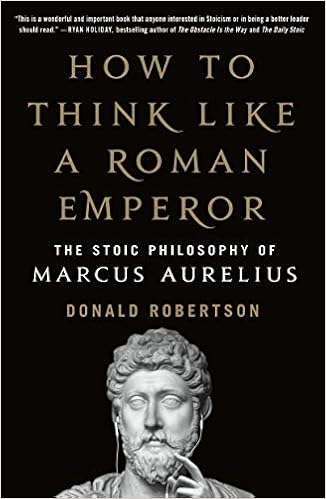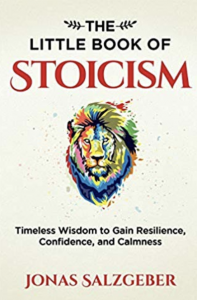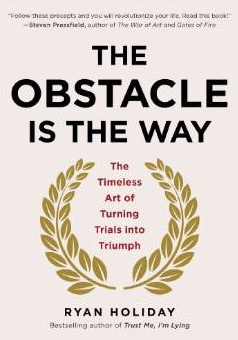I recently read “How to Think Like a Roman Emperor: The Stoic Philosophy of Marcus Aurelius” by Donald J. Robertson. Below are the quotes I found most interesting (via Kindle page numbers). If you like the quotes, buy the book here.
 Anxiety largely consists of the belief, for example, that “something bad is going to happen,” (Location 136-136)
Anxiety largely consists of the belief, for example, that “something bad is going to happen,” (Location 136-136)
CBT and Stoicism have some fundamental psychological assumptions in common, particularly the “cognitive theory of emotion,” which holds that our emotions are mainly determined by our beliefs. Anxiety largely consists of the belief, for example, that “something bad is going to happen,” (Location 134-136)
Socrates used to say that death is like some prankster in a scary mask, dressed as a bogeyman to frighten small children. The wise man carefully removes the mask and, looking behind it, he finds nothing worth fearing. (Location 242-243)
Marcus wrote that nobody is so fortunate as not to have one or two individuals standing by his deathbed who will welcome his demise. (Location 336-338)
The Stoics observed that often those who are most desperate to flee death find themselves rushing into its arms. (Location 353-354)
Zeno founded his own school in a public building overlooking the agora known as the Stoa Poikile, or “Painted Porch,” where he used to vigorously pace up and down as he discoursed on philosophy. The students who gathered there were originally known as Zenonians but later called themselves Stoics, after the stoa, or porch. It’s possible the name “Stoic” also hints at the practical, down-to-earth nature of the philosophy. (Location 418-421)
Our initial automatic feelings are to be viewed as natural and indifferent. (Location 554-554)
Epictetus, in typical Stoic fashion, continually warned his students not to confuse academic learning with wisdom. (Location 620-621)
When animals are alarmed by the appearance of danger, they take flight, but after they have escaped, their anxiety soon abates and they return to grazing in peace once again. By contrast, the human capacity for thought allows us to perpetuate our worries beyond these natural bounds. (Location 838-841)
Stoic philosophy, which teaches us to accept our involuntary emotional reactions, our flashes of anxiety, as indifferent: neither good nor bad. What matters, in other words, isn’t what we feel but how we respond to those feelings. (Location 887-889)
We usually think of rhetoric as something used to manipulate other people. We tend to forget we’re doing it to ourselves as well, not only when we speak but also when we use language to think. (Location 930-931)
Clients suffering from anxiety should write “decatastrophizing scripts” in which they describe distressing events factually, without strong value judgments or emotive language. (Location 978-979)
One day, as Agrippinus was preparing to dine with his friends, a messenger arrived announcing that the Emperor Nero had banished him from Rome as part of a political purge. “Very well,” said Agrippinus, shrugging, “we shall take our lunch in Aricia,” the first stop on the road he would have to travel into exile. (Location 1015-1017)
Anger is nothing but temporary madness. (Location 1096-1096)
One of [method] is to wait until our feelings have naturally abated and then calmly consider what someone wise would do in a similar situation. (Location 1101-1102)
One of Aesop’s fables, which says that each of us is born with two sacks suspended from our neck: one filled with the faults of others that hangs within our view and one hidden behind our back filled with our own faults. (Location 1176-1178)
A cheerful acceptance of that hindrance is required, along with a tactful shift to doing what circumstances allow (Location 1298-1298)
Writing down the virtues possessed by a hypothetical wise man or woman, or those we aspire to ourselves, is usually a very beneficial exercise. (Location 1358-1359)
You can ask yourself these three very simple questions: 1. What did you do badly? 2. What did you do well? 3. What could you do differently? (Location 1414-1418)
People still confuse pleasure with happiness. (Location 1544-1544)
“Nothing that is really good and admirable,” cautioned Arete, “is granted by the gods to men without some effort and application.”(Location 1567-1568)
From the Stoic perspective Hercules remained cheerful, despite the terrible things he endured. He enjoyed a profound sense of inner satisfaction knowing that he was fulfilling his destiny and expressing his true nature. His life had something far more satisfying than pleasure: it had purpose. (Location 1594-1596)
the goal of his life is not pleasure but action. (Location 1621-1621)
Socrates had likewise claimed, paradoxically, that those who practice self-control actually obtain more pleasure from things like food and drink than those who indulge in them to excess. (Location 1772-1773)
The same principle, that self-awareness disrupts the automatic quality of the behavior, can be very helpful when you actually want to break a bad habit. (Location 1877-1878)
Set aside ten minutes each day to write stories for your children. (Location 2001-2002)
Epictetus told his Stoic students to imagine they’re guests at a banquet being handed a sharing plate, not greedily holding on to it and scoffing the lot but politely taking an appropriate share and then handing the rest along. (Location 2016-2017)
Be grateful for external things without becoming overly attached to them. (Location 2018-2018)
By focusing instead on the limits of your pain, whether in terms of duration or severity, you can develop a mind-set that’s more oriented toward coping and less overwhelmed by worry or negative emotions about your condition. (Location 2166-2168)
Dependence on being able to escape from stressful situations just creates its own problems. (Location 2727-2728)
He asked a group of college students to spot the times during a four-week period when they began to worry about something and to respond by postponing thinking about it any further until a specified “worry time” later in the day. Using this simple technique, the subjects were able to reduce the time spent worrying by almost half, and other symptoms of anxiety were also reduced. (Location 2788-2791)
The steps to follow in worry postponement build upon the general framework that should be familiar to you by now: 1. Self-monitoring: Be constantly on the lookout for early warning signs of worry, such as frowning or fidgeting in certain ways—this awareness alone will often derail the habit of worrying. 2. If you are unable to address your anxiety immediately using Stoic techniques, postpone thinking about it until your feelings have abated naturally, returning to the problem at a specified “worry time” of your choosing. 3. Let go of the thoughts without trying to actively suppress them—instead, just tell yourself you’re setting them aside temporarily to come back to them later at a specified time and place. Cognitive distancing techniques can be helpful in this regard. On a piece of paper to remind yourself of the thing you’re worried about, then fold it up and put it in your pocket to address later. 4. Return your attention to the here and now, expanding your awareness through your body and your surroundings, and try to notice small details you’d overlooked before. Worry goes chasing after future catastrophes and therefore requires inattention to the present moment. Become grounded in the here and now instead: “Lose your mind and come to your senses!” 5. Later, when you return to the worry, if it no longer seems important, you might just leave it alone. Otherwise, visualize the worst-case scenario or feared outcome that’s making you anxious, using the technique of imaginal exposure or premeditation of adversity. 6. Use cognitive distancing by telling yourself “It’s not things that upset me but my judgments about them.” (Location 2801-2808)
Decatastrophize by describing the feared event in objective terms, without emotive language or value judgments. Remind yourself of its temporary nature by asking “What next?” and considering how things will move on over time. (Location 2808-2810)
Stoics believed that anger is a form of desire: “a desire for revenge on one who seems to have done an injustice inappropriately,” (Location 3008-3009)
Modern cognitive theories of anger, which typically define it as based upon the belief that a rule that is personally important to you has somehow been violated. (Location 3011-3012)
We might say that anger typically consists in the desire to harm someone because we think they’ve done wrong and deserve to be punished. (Location 3009-3010)
Anger stems from the idea that an injustice has been committed, or someone has done something they shouldn’t have done. (Location 3012-3013)
1. Self-monitoring. Spot early warning signs of anger, to nip it in the bud before it escalates. For example, you might notice that your voice begins to change, or that you frown or your muscles tense, when you’re beginning to grow angry, or you may think of someone’s actions as unjust or in violation of a personal rule. (“How dare she say that to me!”) 2. Cognitive distancing. Remind yourself that the events themselves don’t make you angry, but rather your judgments about them cause the passion. (“I notice that I am how to respond to the situation. Take a breath, walk away, and come back to it a few hours later. If you still feel like you need to do something, then calmly decide upon the best response; otherwise, just let it go and forget about it. 4. Modeling virtue. Ask yourself what a wise person such as Socrates or Zeno would do. What virtues might help you to respond wisely? In your case, it might be easier to think of a role model you’re more familiar with, like Marcus Aurelius or someone you’ve encountered in your own life. (“A wiser person would try to empathize, put themselves in her shoes, and then exercise patience when they’re responding…”) 5. Functional analysis. Picture telling myself ‘How consequences of following anger versus following reason and exercising virtues such as moderation. (“If I let my anger guide me then I’ll probably just yell at her and get into another argument, and things will get a lot worse over time until we’re not speaking anymore. If I wait until I’ve calmed down and then try to listen patiently, though, it might be difficult at first but it will probably start to work better with practice, and once she’s calmed down maybe she’ll begin listening to my perspective.”) (Location 3016-3038)
One of the most common mistakes we make is trying to challenge our angry thoughts when we’re not in the best frame of mind to do so. Instead, use these thinking strategies beforehand, in advance of facing situations that might provoke anger, or after you’ve taken time to regain your composure. (Location 3039-3041)
It’s natural to mourn—even some animals grieve the loss of their young. But there are those who go beyond the natural bounds of grief and let themselves be swept away entirely by melancholy thoughts and passions. The wise man accepts his pain, endures it, but does not add to it. (Location 3332-3334)
Leaves that the wind scatters to the ground, Such are the generations of men. (Location 3339-3340)
Everything is different, but underneath it’s all the same: anonymous individuals marrying, raising children, falling sick, and dying. Some fight wars, feast, work the land, and trade their wares. Some flatter others or seek to be flattered, suspect their fellows of plotting against them, or hatch their own plots. Countless among them engage in intrigues, pray for the death of others, grumble at their lot, fall in love, pile up fortunes, or dream of high office or even a crown. How many individuals whose names we’ll never know, their lives extinguished, lie forgotten, as if they had never been born at all? Yet turn your thoughts to the mighty, and what difference does it make? Death comes knocking at the king’s palace and the beggar’s shack alike.(Location 3355-3360)
It’s vanity to worry about how history will record your actions. (Location 3370-3371)
I’m surrounded by people who are overly concerned with what future generations will think of them. They might as well lament the fact that centuries ago, before their birth, their names were utterly unknown. The lips of mankind can grant you neither fame nor glory worth seeking. What matters is how I face this moment, which shall soon be gone. (Location 3371-3373)
Fear of death does us more harm than death itself because it turns us into cowards, whereas death merely returns us to Nature. (Location 3385-3386)
To practice death in advance is to practice freedom and to prepare oneself to let go of life gracefully. (Location 3391-3392)
after darkness and ignorance come arts and sciences, then the inevitable descent once again into darkness and ignorance. (Location 3428-3428)
The universe is a single living being, with a single body and a single consciousness. Every individual mind a tiny particle of one great mind. Each living creature like a limb or organ of one great body, working together, whether they realize it or not, to bring about events in accord with one great impulse. Everything in the universe so intricately woven together, forming a single fabric and chain of events. (Location 3456-3456)
Man was meant to be like this: striving his whole life with patient endurance to cultivate the pure light of wisdom within himself and allowing it to shine forth for the benefit of others. Alone and yet at one with the community of fellow men around him, living wisely and in concord with them. (Location 3476-3478)



